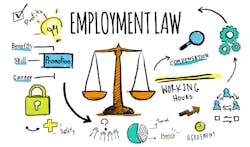It seems like there are always changes occurring in employment law. Speaking at a recent NationaLease meeting, Neil H. Dishman of Jackson Lewis P.C. shared information on employment law updates that had recently taken place or were taking place in the near future.
Paid sick leave is a hot employment law topic, and if not already required, very soon 13 states and 23 cities and counties will require paid sick leave. If compliance is required, this payout could be painful for smaller companies.
Common features of paid sick leave:
- Minimum amount of sick leave that employees accrue
- Allowable uses are very broad, and include family members
- Carryover is required
- Limitation on how much notice can be required.
The Paid Sick Leave Ordinance (PSLO) can vary by state, county or city. For example, in the City of Chicago, in order to be eligible for paid sick leave, employees must work for their employer for at least six months, work at least two hours within the City in any two-week period, and work at least 80 hours during any 120-day period.
If any employee meets all these requirements, employers are required to give one hour of sick leave for every 40 hours worked, up to a maximum of 40 hours in each one-year period. Employees can carry over 2.5 hours of paid sick days for the following one-year period, but employers are not required to pay employees for unpaid sick days. Paid sick leave also extends to employees’ covered family members.
Make sure that you understand PSLO rules in your area and check to see if they apply to your company.
Some myths about PSLO include:
- “We don’t have a facility in [jurisdiction], so this doesn’t apply to us.”
- “We have a very generous accrual of PTO, greater than the PSLO requires, so we already comply with this.”
- “We are only in ‘red states’ that don’t have this kind of nonsense.”
Here’s a look at some other employment law trends:
- Mandatory harassment training — the #metoo movement has boosted demand for sexual harassment training nationwide.
- Prohibiting confidentiality of harassment settlements, or NDAs more generally for low-level employees — another result of the #metoo movement seeks to eliminate unethical company practices that have been implemented to hide sexual harassment, assault and abuse in the workplace.
- Prohibiting or limiting arbitration agreements — “The Forced Arbitration Injustice Repeal Act” (“FAIR Act”) was introduced into the Senate in February 2019, which prohibits a pre-dispute arbitration agreement from being valid or enforceable if it requires arbitration of an employment, consumer, antitrust, or civil rights dispute. No further action has yet been taken on this bill.
- Prohibiting salary inquiries of applicants — State and local governments are adopting laws and regulations that prohibit employers from requesting salary history information from job applicants, seeking to curb the cycle of pay discrimination.
- Medical and recreational marijuana — Most states that have legalized medical or recreational cannabis leave testing and decisions made thereafter up to the individual employer’s discretion. Many states do have some kind of statutory language requiring employers to not refuse employment or otherwise discriminate against a qualifying medical cannabis patient, but that discrimination language does not carry over to recreational marijuana users. Expect to see more discussion on that topic.
- $15 minimum wage — A bill passed by the Senate in July 2019 calls for gradually raising the minimum wage to $15 per hour by 2025.
- “Predictive scheduling” — Predictive scheduling laws require employers to post employees' work schedules a certain amount of time in advance and penalize employers for last minute changes to schedules.
About the Author
Jane Clark
Senior VP of Operations
Jane Clark is the senior vice president of operations for NationaLease. Prior to joining NationaLease, Jane served as the area vice president for Randstad, one of the nation’s largest recruitment agencies, and before that, she served in management posts with QPS Companies, Pro Staff, and Manpower, Inc.
